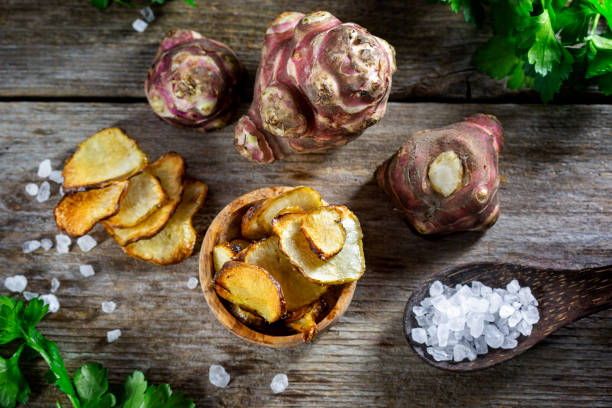Jerusalem artichoke not only impresses with its interesting nutty taste – it is also extremely healthy. Everything you need to know about the exotic tuber!
Jerusalem artichoke is an uncomplicated regional vegetable that scores particularly well with its healthy ingredients. With a relatively low-calorie balance, the tuber has many vitamins and minerals that make it an excellent contribution to a healthy diet.
Cultivation, purchase, and storage of Jerusalem artichokes
How does Jerusalem artichoke grow, where to get it and how to store it? All facts at a glance.
Cultivation and season
Jerusalem artichoke is an uncomplicated plant that can thrive in many different soils. From a botanical point of view, the plants, which can grow up to two meters high, have yellow flowers and are related to the sunflower. The edible tubers grow underground on runners and can be harvested between autumn and spring.
What do you have to pay attention to when buying?
You can find Jerusalem artichokes in season at weekly markets, in organic shops, or health food stores. Some well-stocked supermarkets also have the tuber in their range. When buying, you should make sure that the vegetables have tight, shiny skin and are undamaged. It should not be wrinkled or heavily soiled.
What is the best way to store Jerusalem artichoke?
Jerusalem artichokes are best kept in a cool, dry, and dark place in the pantry or the cellar. It stays there for a few weeks. If you don’t have this option, it is best to keep the tuber wrapped in a damp cloth in the vegetable compartment of the refrigerator. However, it should be used within a week, otherwise, the aroma and nutrients will be lost. If you have your own Jerusalem artichoke plant in the garden, you can always harvest fresh as needed
What should be considered when eating Jerusalem artichoke?
Jerusalem artichoke tends to turn brown after peeling. This is not harmful, but unsightly. To avoid discoloration, place the vegetables in a bowl of cold water with a dash of lemon juice or vinegar immediately after peeling them. In addition, vegetable is highly perishable. Therefore, check the bulbs for mold before eating. If you notice a foul smell, it’s better to throw the whole piece away.
This is what makes Jerusalem artichoke so healthy
Jerusalem artichoke has a water content of around 80 percent, which is why the tuber scores with a low-calorie balance. Because the fiber content is also very high, the vegetables are extremely filling and good for digestion. The plant also contains healthy vitamins: it contains vitamins A, B, and C. The ingredients also include minerals such as iron, calcium, and potassium.
Nutritional table at a glance (100 grams of raw Jerusalem artichoke):
- Calories: 31
- Carbohydrates: 4 grams
- Protein: 2.4 grams
- Fat: 0.4 grams
Preparation of Jerusalem artichoke
Jerusalem artichoke can be eaten raw or cooked. Before eating, however, the healthy vegetables must be peeled. Because the tubers sometimes grow quite slender, this is not easy. It works easier if the vegetables are cooked in boiling water for a few minutes. Then quenched with cold water, it can be peeled like a jacket potato. Raw Jerusalem artichoke gives salads a nutty note. Cooked, the preparation options are particularly versatile: the tubers can be served cooked as a side dish or processed into a puree, creamy soups, casseroles or fried as chips. However, if Tobinambur is consumed unprocessed, the density of healthy nutrients is greatest.



